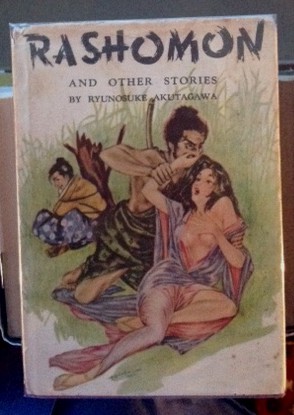Inspiring Older Readers
 posted on 10 May 2018
posted on 10 May 2018
Rashomon and Other Stories by Ryunosuke Akutagawa
I suspect that for most people in the West, Rashomon is better known as a film directed by the hugely talented Akira Kurosawa than a story from the pen of the equally hugely talented Ryunosoke Akutagawa. I’m glad both exist but I’m hugely delighted to have discovered the wider works of Akutagawa that are to be found in this relatively slim volume.
Akutagawa was born in 1892 and by 1927 he was dead by his own hand. That simple sentence is probably enough to alert you to the fact that his was not a happy life and the details of his 35 years are dominated by his slide into a distressing form of mental illness that saw him tormented by hallucinations and anxiety.
This selection published by Charles Tuttle and translated by Takashi Kojima in 1952 consists of six short stories that perfectly showcase Akutagawa’s qualities – a spare, lucid prose that references both classical Japanese and Western literary tradition and is characterised by immaculate timing and a humane sensibility.
Writing in The New York Times Book Review, James Kelly captures this beautifully:
“….A satirical writer with a delicate, Chaplinesque quality in which illusion and reality are blended in a kind of fairy-tale surrealism……Spare, textured prose….Clear-eyed glimpses of human behaviour in the extremities of poverty, stupidity, greed, vanity…Story-telling of an unconventional sort, with most of the substance beneath the shining, enamelled surface.”
Although Kurosawa’s movie is entitled Rashomon, the action of the film is in fact based more on the first story in this Akutagawa collection – and one of the most impressive – In A Grove. This is the tale of the opportunistic murder of a husband and rape of a wife in a secluded grove by a robber. The distressing events are seen through the eyes and different perspectives of the all those the act of violence touches. We even get the testimony of the ghost of the murdered man channelled through a medium. The facts of the murder and rape which seem so certain at the outset get reflected through these different prisms and we are left to ponder how these diverse perspectives change our interpretation of events.
The title story itself, Rashomon, is a macabre little tale set in early Kyoto at the Rashomon gate where the practice of leaving corpses under its awnings has become commonplace. Here a ‘servant of a samurai’ encounters a ghoulish crone stealing hair from female corpses to sell as hairpieces to the rich. Outraged he attacks the crone for her behaviour and her protestations that she will starve without this trade fall on deaf ears. In fact her protestations have quite the opposite effect because the servant decides he too shouldn’t starve and strips from her all her worldly belongings and makes off with them.
Of the other stories – all of them superb in my view – the one that stands out for me is Kesa and Morito which tells the tale of an adulterous couple bound together in a plan to kill Kesa’s husband despite the fact that secretly they don’t really love each other. Again the story is told twice, once from Morito’s perspective and once from Kesa’s – although it is the woman’s version that touches the soul most deeply. In both cases we get the story of marital infidelity and a plot to kill the husband filtered through the internal monologues of the two plotters – each secretly regretting their decision and each seemingly unable to break out from the train of inevitability.
I feel like I’ve discovered Akutagawa late in the day and I’m left wondering how he isn’t much better known. I would guess he’s had quite an influence on the work of a more famous contemporary, Haruki Murakami who is feted in the West and regularly tipped for a Nobel award. As often happens when something pops onto your radar for the first time, you start to notice things that might have slipped past before. So, as fate would have it, just as I started reading this collection I went into Waterstones and came across a new novel from David Peace called Patient X which the blurb tells me is “The Case-Book of Ryūnosuke Akutagawa’ (which) presents 12 scenes from the life of the writer known as the father of the Japanese short story”.
So, I guess I know where my reading is taking me next…….
Terry Potter
May 2018